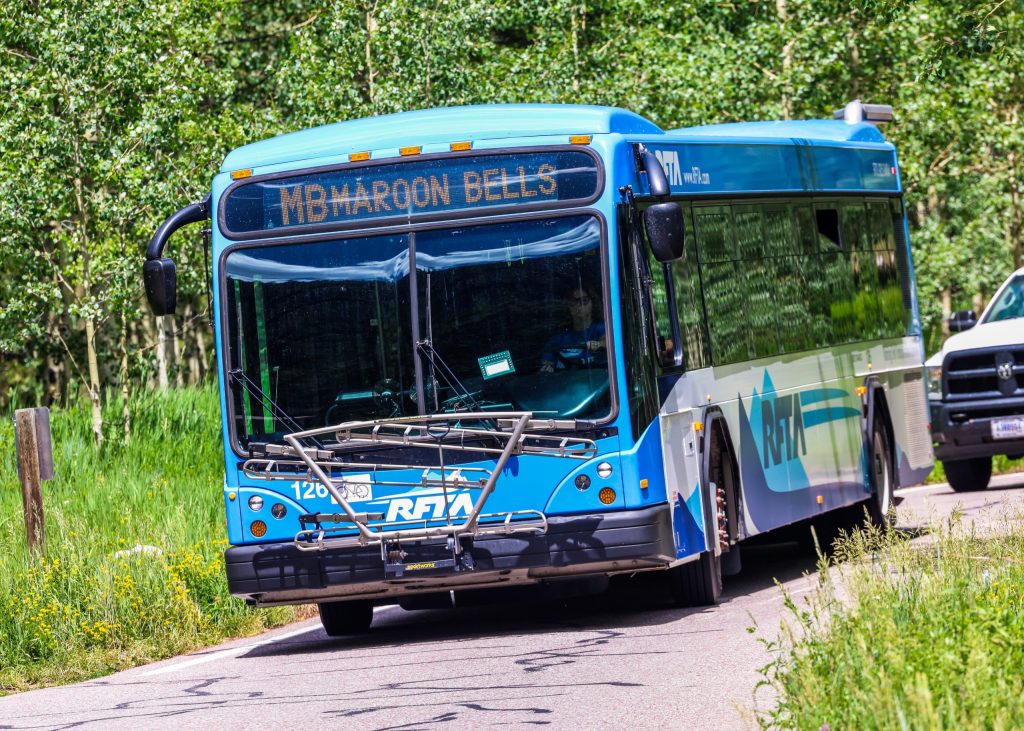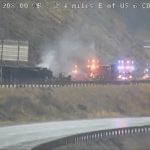Rifle City Council says public transportation needs to change in Garfield County — here are some first steps

Austin Colbert/The Aspen Times
Rifle City Council’s meeting Wednesday night centered largely on transportation, featuring presentations from the Western Colorado Alliance and the town of Parachute, as well as discussion under the Older Adult Programs agenda item.
Improving public transportation has long been a key issue across the Western Slope. Interstate 70 remains the primary route between Grand Junction and Denver — and the only major corridor connecting Garfield County’s municipalities — aside from backroads that can turn a four-hour trip into eight or more.
Within Garfield County, communities along I-70 are accessible primarily via the interstate or U.S. Highway 6. The latter, however, doesn’t connect Glenwood Springs to New Castle. While roads branching from Highway 82 and Highway 133 link to Carbondale and Basalt, those routes can be limited or hazardous.
Closures on I-70 — even those as far away as Loveland Pass, such as Sunday’s fatal crash involving a semitractor-trailer that halted traffic for 12 hours — ripple across the state, impacting mobility throughout Colorado.
Many Western Slope residents commute long distances, sometimes traveling daily between Grand Junction and Aspen for work. That dependence on I-70 increases congestion, heightens accident risks and underscores the region’s need for reliable transportation alternatives.
Survey findings
The Western Colorado Alliance shared results from a yearlong transportation survey it conducted across Garfield County.
“We collected about 300 surveys in the past year, and yes, surveys are extremely difficult to collect — people don’t like filling out surveys. I don’t like filling out surveys,” said the organization’s treasurer. “We thought that number of 300 was a good start.”
More than half of respondents were from Rifle, with about a quarter from Silt. Others came from Grand Junction, De Beque, Parachute, New Castle, Glenwood Springs, Carbondale, El Jebel, Snowmass and unincorporated Garfield County. Surveys were collected at community events including Silt Heyday, Hispanic Heritage Day and Latino Conservation Week, as well as at Colorado Mountain College in Rifle during finals week.
“We spent over a year engaging the community in conversations and circulating a bus survey in Spanish and English,” said Deb Grizzle, a volunteer with the Western Colorado Alliance. “About 25% of respondents took the survey in Spanish.”
Rifle and Silt residents made up most responses, with roughly one in four respondents saying they use public transportation at least once a year. Fewer reported using it monthly, weekly or daily. Garcia, another volunteer, said many participants were seniors, as surveys were distributed at senior centers in Rifle and Silt.
“A second big focus was barriers to transportation,” Garcia said. “Residents shared that the top barriers for riding buses are related to convenience and service limitations. The top concern is a limited bus schedule — people need more frequent rides. The next most common barriers are the distance between homes and the nearest bus stops.”
Rifle News
Local stories, community updates — 12,000+ readers get it first.
Sign up weekly at TheCitizenTelegram.com/Newsletter
Local transit systems
The Roaring Fork Transportation Authority (RFTA) operates the primary bus service in Garfield County, though its westernmost route currently runs only between Glenwood Springs and Rifle, with Rifle stops concentrated along Railroad Avenue.
Many smaller towns lack basic amenities, forcing residents to travel elsewhere. Silt residents, for example, must go to Rifle or New Castle for groceries, and only Rifle and Glenwood Springs have Walmart stores. Transportation access is also critical for health care.
“I’m an occupational therapist at Grand River Health,” said Christina Senechal. “We talk about the difficulties of getting to the hospital for care. I had a patient from Parachute who couldn’t come for pool therapy because gas is too expensive. He just couldn’t afford it.”
Senechal added that many patients struggle with mobility or fixed incomes, making it difficult to drive or use ride services like Uber.
The town of Parachute also presented updates on the Parachute Area Transit System, or PATS, which is funded in part by Rifle and Garfield County. PATS routes connect Parachute to Rifle, stopping at the RFTA station, Walmart and Grand River Health. The Garfield County commissioners recently signed a letter supporting continued funding for the system.
Parachute Community and Economic Development Director Vinnie Tomasulo said the town is exploring a partnership with Downtowner, a private microtransit company operating in Aspen since 2016.
“Basically, they would utilize the funds we’re currently receiving from our partners and from the town to operate going forward,” Tomasulo said. “They told us, ‘You tell us how you want to do it, and we’ll manage it for you.'”
If approved, the transition would allow riders to request rides via an app, similar to Uber or Lyft. The system would also collect trip data to help optimize service coverage.
Older adult transportation
Rifle Senior Center Director Tami Sours also spoke about the Seven-Party Memorandum of Understanding Regarding Garfield County Older Adult Programs for 2026. The agreement involves the municipalities of Rifle, Silt, New Castle, Glenwood Springs and Carbondale, along with RFTA and the Garfield County commissioners.
A major focus is RFTA’s Traveler program, which provides rides for older adults. The service covers all addresses within two miles of I-70 between Parachute and Glenwood Springs, as well as two miles of Highway 82 between Carbondale and Glenwood Springs and the community of Battlement Mesa.
“They put in quite a few restrictions about 10 years ago, when I first started, because they were worried about the senior population booming and not being able to keep up with requests,” Sours said. “It used to be that anyone 60 or 65 and older could ride the Traveler, so they started requiring disability assessments.”
Sours said RFTA has since recognized the program became too restrictive. The agency is loosening requirements, now allowing anyone 70 or older to use the Traveler and reducing advance notice for ride requests from 48 hours to 24.
Still, Sours said gaps remain. Many seniors who take an ambulance to the hospital struggle to find transportation home afterward, leaving a critical need for accessible, affordable rides in Garfield County.

Support Local Journalism

Support Local Journalism
Readers around Glenwood Springs and Garfield County make the Post Independent’s work possible. Your financial contribution supports our efforts to deliver quality, locally relevant journalism.
Now more than ever, your support is critical to help us keep our community informed about the evolving coronavirus pandemic and the impact it is having locally. Every contribution, however large or small, will make a difference.
Each donation will be used exclusively for the development and creation of increased news coverage.










